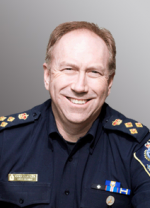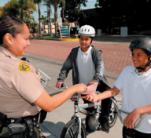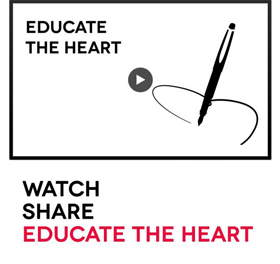Accentuate the Positive: Tickets with a Twist

Former RCMP officer Ward Clapham instituted Positive Tickets in 2002. The program’s goal? To reward the often unacknowledged good that kids and young adults do within the community. Ticketing began in 2002. Kids who were recognized for good deeds were given vouchers for free sodas, movie passes and other recreational activities, or simply an acknowledgment of gratitude for doing something good. Since then, the program has expanded beyond British Columbia with half-a-million tickets issued to date. As Ward told the Dalai Lama Center, Positive Tickets has far exceeded the expectations of its founder.
DLC: Positive Tickets began as a means of rewarding “good kids.” Have you always been a believer in youth?
Ward Clapham: Of course. And it took me all of three seconds on the job to see the huge gap of an unbelievable, wide open area that we were not addressing the way we should and turning that around to empower the youth and you can get involved. (Adults) can make a difference, it’s just a matter of making that a primary not a secondary issue.
 DLC: What was the biggest challenge to overcome?
DLC: What was the biggest challenge to overcome?
WC: There was a paradigm shift for some law enforcement officers who were trained to deal with the law enforcement paradigm, you pull out the law book and you look at what rule had been broken. Here we were pushing transformational cultural change by saying, ‘let’s not just look at the negative, let’s think about holistic comprehensive ways to work with young people.’ It took a couple of years, but that’s all right; you can’t make transformational change overnight.
DLC: Can you tell me a bit about how Keith Pattinson (a BC-based storyteller and educator) inspired you into action?
WC: That was years later, but right at the beginning of my career I was posted in a very challenging community in North Eastern Alberta, an isolated community. I became a scout leader to a group of boys. I felt that if I could have them with me on Friday and Saturday nights, even if it was just for pizza, even if I was working in between, it was better than leaving them out in the streets. (This way) I could give them a compass, giving them a role model, giving them a friend. Chasing them was not making any sense. The mindset of many officers was to see them as enemies, especially on a Friday night chasing them from crime to crime, party to party, disturbance to disturbance. It’s pretty easy to think these kids were up to no good.
Years later, while working in Nanaimo, I saw Pattinson give a talk about the 40 Developmental Assets, really just talking about turning everything around, looking at the strengths and assets of young people bring. The more assets young people have in their life, the less chances of them being involved in drugs, crime, alcohol use and teenage pregnancy.
DLC: Did you critics and detractors of the program? What were they saying? And how did you respond?
 WC: Some of the critics still say ‘half of the tickets weren’t redeemed.’ Well, its not about the ticket or the free item, it was about the relationship and trust that is built up over time. I couldn’t care less what each kid did with the ticket for free soft drink or free skate. But critics are so stuck in that mindset, its my job to wake them up: you’ve got to look at it differently. We are in a very quick-fix world that wants instant results and it just doesn’t happen when you a build trust or create the environment for young people to explore and talk about their feelings.
WC: Some of the critics still say ‘half of the tickets weren’t redeemed.’ Well, its not about the ticket or the free item, it was about the relationship and trust that is built up over time. I couldn’t care less what each kid did with the ticket for free soft drink or free skate. But critics are so stuck in that mindset, its my job to wake them up: you’ve got to look at it differently. We are in a very quick-fix world that wants instant results and it just doesn’t happen when you a build trust or create the environment for young people to explore and talk about their feelings.
DLC: Did you ever imagine Positve Tickets would become as big as it has?
WC: They say ‘deliver the unexpected’ well, who would expect this? That’s why its gained so much traction around the world. It’s the last thing you’d expect: police hiding behind bushes trying to catch kids doing things right. We were issuing 40,000 a year, a 3:1 ratio against negative tickets in Richmond at our peak. And when you think about it, the ticket is the gateway to the relationship, its the relationship to the beginning of mindfulness and towards a more peaceful co-existence.
DLC: Where do you see Positive Tickets in 5 years?
Ward Clapham: It would be great to see this embraced by any community; and it doesn’t have to be police officers. It could be bus drivers. Any first responder, any employee, anybody who sees a positive act. Let’s just recognize the positive out there.
For more information about Ward Clapham and his program visit www.positivetickets.com







Comments
Post new comment